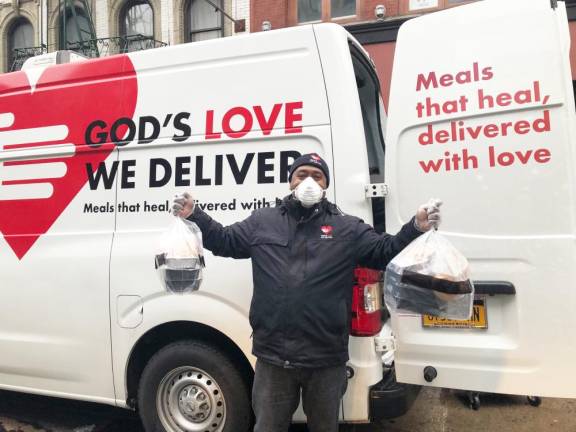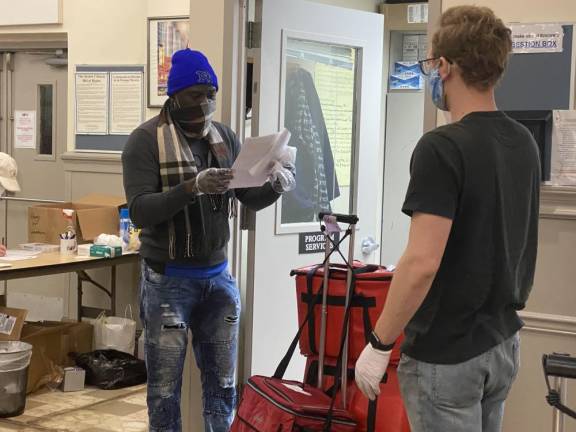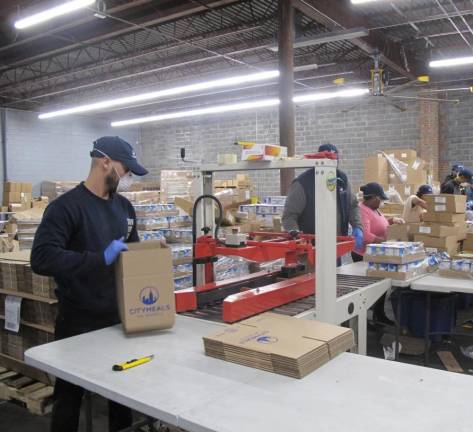Funds for Emergency Food Providers
City and state governments pledge financial help to deal with a rise in food insecurity



The coronavirus crisis has sparked another crisis in the city - a rise in food insecurity.
To help “the last line of defense,” as Council Member Alicka Ampry-Samuel put it, $50 million in government funds split between the City and the State have been pledged to emergency food providers throughout NYC. More than 800 food organizations may be eligible for the financial help, which will ensure that they remain open and functioning in the coming months, in anticipation of feeding an extraordinary number of New Yorkers.
The money will provide funding for 19 million meals. Politico last month published a list of organizations that will reportedly receive the City’s funding. For example, Met Council, a poverty-fighting Jewish charity organization, will receive $6 million, designated for “food and protective equipment for badly-needed volunteers.” City Harvest, NYC’s largest food rescue organization, will get $5 million.
“Even in normal times,” said Council Member Karen Koslowitz, “our food pantries operate on the edge. Our current health emergency is pushing our food pantries beyond their capabilities.”
While most emergency food programs are still functioning and providing services, some 32 percent of them have been forced to halt their operations due to a lack in supplies and resources. “For many [individuals], these programs mean the difference of access to a hot meal or going to bed hungry each night,” said Council Member Daniel Dromm.
Referrals from the Community
God’s Love We Deliver cooks and delivers medically tailored meals to those who have life-altering illnesses, such as HIV/AIDS, renal disease, heart disease, Alzheimer’s disease, or cancer. Since their start in 1985, the organization has delivered more than 25 million meals. A spokesperson for God’s Love We Deliver told Straus News that they were quickly notified of their $2 million grant. On Friday they confirmed that they had received and signed the contract for the funding.
Due to the stay-at-home requirement, people can no longer physically go to places where they used to collect meals. Added the spokesperson, “Many seriously ill people who would normally get meals at a senior center or adult day care, or have someone cooking for them, are reaching out for help now.” In a normal week, God’s Love We Deliver sees 100 referrals or so from the community, and now the organization is seeing five times that many.
Other options for food delivery, like family, friends or health aides, are no longer viable. According to their spokesperson, God's Love We Deliver is currently serving “25% more people and 25% more meals than we were just six weeks ago,” which will hopefully be lightened by the funding; the money will go to all aspects of their food delivery operations, to answer the new demand of an increase in clients due to the pandemic.
Because most of their clients are elderly and all are living with underlying conditions, the medically tailored meals God’s Love We Deliver cooks and home-delivers to New Yorkers living with severe illness are critical to their well-being.
While the pandemic has changed many operations for God’s Love We Deliver, the organization remains committed to delivering hope, dignity, love and respect with every meal.
Homebound Seniors
The crisis of food insecurity is pervasive. It ranges from striking whole communities for periods of time, to individuals who haven’t faced it before, but are now due to the coronavirus. Nicholas Buess, Associate Director, Mobilization & Policy at Food Bank For New York City, explained that the funds will “help us ensure more meals are available to New Yorkers, including many who are struggling with food insecurity for the first time.” Food Bank For New York City is slated to receive $3.5 million in funds.
Like God’s Love We Deliver, Citymeals on Wheels, a nonprofit that delivers meals to the homebound elderly, is reported to be eligible for $2 million in emergency funds. Citymeals on Wheels executive director Beth Shapiro informed Straus News that they would use the funds to support their efforts in preparing 450,000 “shelf-stable emergency meals for older New Yorkers in need.”
The funds would also be allocated to maintaining the operations of their weekend home-delivered meal program, which is “growing as a result of increased need for food among seniors at home.” This program partners with local community-based organizations and senior centers to guarantee healthy meals for homebound seniors, since, according to their website, government funding is unavailable for food deliveries during these times. They have since delivered 275,000 weekend meals.
“With more older people staying home, there will be more need for emergency food,” Shapiro added. Within the last month, their home-delivered meal program has increased by 10%. They expect that number to rise. As of May 4, they are serving an additional 10,000 senior New Yorkers.
Shapiro added that many Citymeals on Wheels’ recipients “live alone and have mobility issues ... so our meal deliveries are essential.”
“Even in normal times, our food pantries operate on the edge. Our current health emergency is pushing our food pantries beyond their capabilities.” Council Member Karen Koslowitz